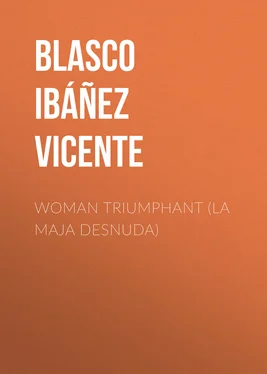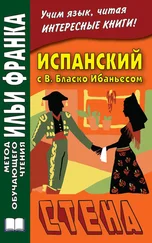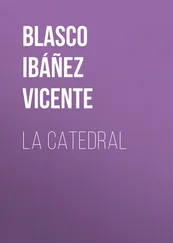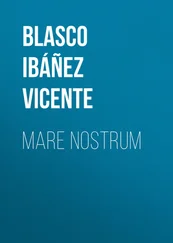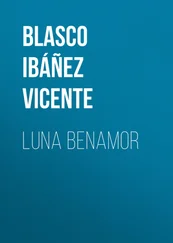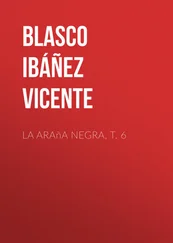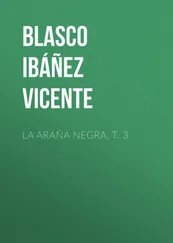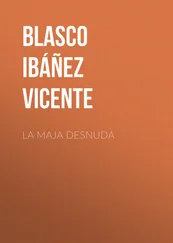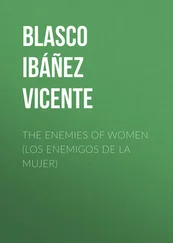Vicente Blasco Ibáñez - Woman Triumphant (La Maja Desnuda)
Здесь есть возможность читать онлайн «Vicente Blasco Ibáñez - Woman Triumphant (La Maja Desnuda)» — ознакомительный отрывок электронной книги совершенно бесплатно, а после прочтения отрывка купить полную версию. В некоторых случаях можно слушать аудио, скачать через торрент в формате fb2 и присутствует краткое содержание. Жанр: foreign_prose, foreign_antique, на английском языке. Описание произведения, (предисловие) а так же отзывы посетителей доступны на портале библиотеки ЛибКат.
- Название:Woman Triumphant (La Maja Desnuda)
- Автор:
- Жанр:
- Год:неизвестен
- ISBN:нет данных
- Рейтинг книги:5 / 5. Голосов: 1
-
Избранное:Добавить в избранное
- Отзывы:
-
Ваша оценка:
- 100
- 1
- 2
- 3
- 4
- 5
Woman Triumphant (La Maja Desnuda): краткое содержание, описание и аннотация
Предлагаем к чтению аннотацию, описание, краткое содержание или предисловие (зависит от того, что написал сам автор книги «Woman Triumphant (La Maja Desnuda)»). Если вы не нашли необходимую информацию о книге — напишите в комментариях, мы постараемся отыскать её.
Woman Triumphant (La Maja Desnuda) — читать онлайн ознакомительный отрывок
Ниже представлен текст книги, разбитый по страницам. Система сохранения места последней прочитанной страницы, позволяет с удобством читать онлайн бесплатно книгу «Woman Triumphant (La Maja Desnuda)», без необходимости каждый раз заново искать на чём Вы остановились. Поставьте закладку, и сможете в любой момент перейти на страницу, на которой закончили чтение.
Интервал:
Закладка:
Vicente Blasco Ibáñez
Woman Triumphant (La Maja Desnuda)
INTRODUCTORY NOTE TO THE ENGLISH TRANSLATION
The title of this novel in the original, La maja desnuda , "The Nude Maja," is also the name of one of the most famous pictures of the great Spanish painter Francisco Goya.
The word maja has no exact equivalent in English or in any of the modern languages. Literally, it means "bedecked," "showy," "gaudily attired," "flashy," "dazzling," etc., and it was applied at the end of the eighteenth century and at the beginning of the nineteenth to a certain class of gay women of the lower strata of Madrid society notorious for their love of dancing and their fondness for exhibiting themselves conspicuously at bull-fights and all popular celebrations. The great ladies of the aristocracy affected the free ways and imitated the picturesque dress of the maja ; Goya made this type the central figure of many of his genre paintings, and the dramatist Ramón de la Cruz based most of his sainetes —farcical pieces in one act—upon the customs and rivalries of these women. The dress invented by the maja , consisting of a short skirt partly covered by a net with berry-shaped tassels, white mantilla and high shell-comb, is considered all over the world as the national costume of Spanish women.
When the novel first appeared in Spain some years ago, a certain part of the Madrid public, unduly evil-minded, thought that it had discovered the identity of the real persons whom I had taken as models to draw my characters. This claim provoked a scandalous sensation and gave my book an unwholesome notoriety. It was thought that the protagonists of La maja desnuda were an illustrious Spanish painter of world-wide fame, who is my friend, and an aristocratic lady very celebrated at the time but now forgotten. I protested against this unwarranted and fantastic interpretation. Although I draw my characters from life, I do so only in a very fragmentary way (like all the great creative novelists whom I admire as masters in the field of fiction), using the materials gathered in my observations to form completely new types which are the direct and legitimate offspring of my own imagination. To use a figure: as a novelist I am a painter, not a photographer. Although I seek my inspiration in reality, I copy it in accordance with my own way of seeing it; I do not reproduce it with the mechanical servility of the photographic camera.
It is possible that my imaginary heroes are vaguely reminiscent of beings who actually exist. Subconsciousness is the novelist's principal instrument, and this subconsciousness frequently mocks us, leading us to mistake for our own creation the things which we have unwittingly observed in Nature. But despite this, it is unfair, as well as risky, for the reader to assign the names of real persons to the characters of fiction, saying, "This is So-and-so."
It would be equally unfair to consider this novel as audacious or of doubtful morality. The artistic world which I describe in La maja desnuda cannot be expected to have the same conception of life as the conventional world. Far from believing it immoral, I consider this one of the most moral novels I have ever written. And it is for this reason that, with a full realization of the standards demanded by the English-reading public, I have not hesitated to authorize the present translation without palliation or amputation, fully convinced that the reader will not find anything in this novel objectionable or offensive to his moral sense. Morality is not to be found in words but in deeds and in the lessons which these deeds teach.
The difficulty of adequately translating the word maja into English led to the adoption of "Woman Triumphant" as the title of the present version. I believe it is a happy selection; it interprets the spirit of the novel. But it must be borne in mind that the woman here is the wife of the protagonist. It is the wife who triumphs, resurrecting in spirit to exert an overwhelming influence over the life of a man who had wished to live without her.
Renovales, the hero, is simply the personification of human desire, this poor desire which, in reality, does not know what it wants, eternally fickle and unsatisfied. When we finally obtain what we desire, it does not seem enough. "More: I want more," we say. If we lose something that made life unbearable, we immediately wish it back as indispensable to our happiness. Such are we: poor deluded children who cried yesterday for what we scorn to-day and shall want again to-morrow; poor deluded beings plunging across the span of life on the Icarian wings of caprice.
Vicente Blasco Ibañez.New York, January, 1920.
WOMAN TRIUMPHANT
PART I
I
It was eleven o'clock in the morning when Mariano Renovales reached the Museo del Prado. Several years had passed since the famous painter had entered it. The dead did not attract him; very interesting they were, very worthy of respect, under the glorious shroud of the centuries, but art was moving along new paths and he could not study there under the false glare of the skylights, where he saw reality only through the temperaments of other men. A bit of sea, a mountainside, a group of ragged people, an expressive head attracted him more than that palace, with its broad staircases, its white columns and its statues of bronze and alabaster—a solemn pantheon of art, where the neophytes vacillated in fruitless confusion, without knowing what course to follow.
The master Renovales stopped for a few moments at the foot of the stairway. He contemplated the valley through which you approach the palace—with its slopes of fresh turf, dotted at intervals with the sickly little trees—with a certain emotion, as men are wont to contemplate, after a long absence, the places familiar to their youth. Above the scattered growth the ancient church of Los Jerónimos, with its gothic masonry, outlined against the blue sky its twin towers and ruined arcades. The wintry foliage of the Retiro served as a background for the white mass of the Casón. Renovales thought of the frescos of Giordano that decorated its ceilings. Afterwards, he fixed his attention on a building with red walls and a stone portal, which pretentiously obstructed the space in the foreground, at the edge of the green slope. Bah! The Academy! And the artist's sneer included in the same loathing the Academy of Language and the other Academies—painting, literature, every manifestation of human thought, dried, smoked, and swathed, with the immortality of a mummy, in the bandages of tradition, rules, and respect for precedent.
A gust of icy wind shook the skirts of his overcoat, his long beard tinged with gray and his wide felt hat, beneath the brim of which protruded the heavy locks of his hair, that had excited so much comment in his youth, but which had gradually grown shorter with prudent trimming, as the master rose in the world, winning fame and money.
Renovales felt cold in the damp valley. It was one of those bright, freezing days that are so frequent in the winter in Madrid. The sun was shining; the sky was blue; but from the mountains, covered with snow, came an icy wind, that hardened the ground, making it as brittle as glass. In the corners, where the warmth of the sun did not reach, the morning frost still glistened like a coating of sugar. On the mossy carpet, the sparrows, thin with the privations of winter, trotted back and forth like children, shaking their bedraggled feathers.
The stairway of the Museo recalled to the master his early youth, when at sixteen he had climbed those steps many a time with his stomach faint from the wretched meal at the boarding-house. How many mornings he had spent in that old building copying Velásquez! The place brought to his memory his dead hopes, a host of illusions that now made his smile; recollections of hunger and humiliating bargaining to make his first money by the sale of copies. His large, stern face, his brow that filled his pupils and admirers with terror lighted up with a merry smile. He recalled how he used to go into the Museo with halting steps, how he feared to leave the easel, lest people might notice the gaping soles of his boots that left his feet uncovered.
Читать дальшеИнтервал:
Закладка:
Похожие книги на «Woman Triumphant (La Maja Desnuda)»
Представляем Вашему вниманию похожие книги на «Woman Triumphant (La Maja Desnuda)» списком для выбора. Мы отобрали схожую по названию и смыслу литературу в надежде предоставить читателям больше вариантов отыскать новые, интересные, ещё непрочитанные произведения.
Обсуждение, отзывы о книге «Woman Triumphant (La Maja Desnuda)» и просто собственные мнения читателей. Оставьте ваши комментарии, напишите, что Вы думаете о произведении, его смысле или главных героях. Укажите что конкретно понравилось, а что нет, и почему Вы так считаете.
